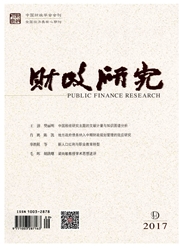

 中文摘要:
中文摘要:
面对经济下行压力,在推动经济结构性改革与社会生产力水平提高的同时,要注意“防范系统性财政风险”的发生。在本文中,我们着重探究了三个问题:一是“后土地财政”时代的到来及欧盟《马约》3%的赤字率与60%的债务率是否要突破。二是单纯按税种属性划分中央税与地方税是否可行,“两个比重”问题是否会再次出现。三是如何守住我国不发生系统性财政风险的底线,及“供给侧”改革、压缩产能、培育新的经济增长动力政策的推进。在这些问题的基础上,本文提出应坚持推行可持续发展的财税政策与财政治理措施,关注宏观财政治理的微观企业基础,助力我国新常态之后的国民经济在“十三五时期”爬坡过坎,真正发挥好财政作为国家治理基础和重要支柱的作用。
 英文摘要:
英文摘要:
Facing of economic downward pressure, when we promote the economic structural reform and increase the level of social productive forces, we should pay attention to "prevent systemic financial risks". In this paper, we emphatically study three problems: Firstly, the "post land finance era" and whether the deficit of 3% and the debt ratios of 60% will be breakthrough. Secondly, the feasibility of dividing central taxes and local taxes by tax attributes and whether the proportion of central taxes and local taxes will imbalances again. Thirdly, how to keep the bottom line of systemic financial risk and promote the "supply side" reform, compress capacity and cultivate new economic growth policy. On the basis of these problems, this article proposed that we should implementation the sustainable development of fiscal and taxation policy and fiscal governance measures, and focus on micro enterprise foundation of macro financial governance. After the new normal of economy, we would make progress on our economy in the "13th Five-Year Plan period". Holding the national fiscal governance as a good basis and an important pillar.
 同期刊论文项目
同期刊论文项目
 同项目期刊论文
同项目期刊论文
 期刊信息
期刊信息
